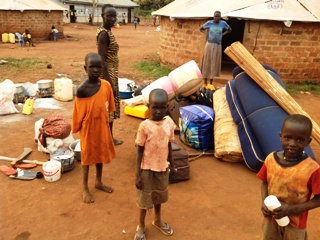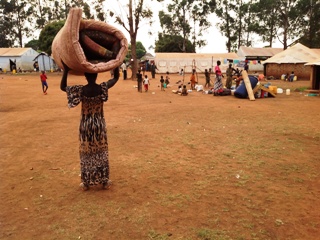FEATURE: S. Sudanese refugees still unsure of home return
February 20, 2014 (KIRYANDONGO) – A group of South Sudanese refugees are camped at a settlement site in Kiryandongo, one of Uganda’s new districts located about 250km north of the capital, Kampala. To most of them, the dream of a home return, was still far from reality.

Widely seen as sparked off by a dispute among the presidential guards, the violence later took an ethnic dimension between the Dinka and Nuer, two of the country’s largest tribes, leaving thousands of people dead and nearly 800,000 homeless.
But for Isaac Nyuon, Uganda was yet another home for him and his family.
“Well, you can survive everywhere. I got displaced on the 15 December that was in Juba where I lost most of my relatives and brothers and I have seen peaceful situations. I will not come back soon to South Sudan,” said Nyuon with a sense of frustration all over his face.
To him, however, putting up the structure was no easy ride due to insufficient money.
“It is not easy here to make maybe a house a day or in a time, a lot of materials are needed here in this house and we don’t buy them at once,” he said.
“So we buy them one by one until it is enough became they are very expensive and transporting them from where I bought them to this place cost a lot. So far, it has taken me three weeks and today they are trying to do the plastering”, added Nyuon.
Rebecca Nyapajiek Gatluok, 48, fled from Juba after she claimed many people, mainly from the Nuer tribe died. Gatluok, who spoke through an interpreter, vowed to remains in Uganda than go back to her largely unstable country.
“This war has affected me deeply. I don’t know whether the international community will get involved to bring peace to South Sudan,” said the 48-year old as she broke into tears.
“There will still be no peace if we still have the same president who ordered the troops to kills the innocent civilians that include my relatives and other colleagues that are civilians in South Sudan. I will not accept than peace has come, until am convinced by God,” she added.
Mary Nyantiop Jok, a Jonglei state resident says she was forced out from her home by conflict.
“Absolutely, I don’t know whether the peace will come. The man of liberation Dr. John [Garang] has already died and now they are just fighting over money,” said Jok.
James Bap Manyol, a pastor from Presbyterian Church says he would not risk returning to South Sudan having witnessed his religious colleagues being killed during the conflict.
“I lost someone who was very important in my life, a pastor senior pastor called Nyang Lam. He died on 17 [December]. The president had called us back to stay at home, but unfortunately they came and killed Lam while I saw that man with my own eye”, said Pastor Manyol.
“He put all colors, all the cloth of leadership but they killed pastor Nyang. And they also killed Racial Nyakan Biel who was the deacon in my church. I fear to go to South Sudan because the president ordered people to die”, he added.

“Now I can’t go back, people they are telling us that there is peace, but there is no any peace, because if you go there, those people who went there they don’t come back”, said Martin.
“Even those who are in UNMISS [UN Mission in South Sudan], if someone went out to get something, they do not return. So I don’t think I will go back there now,” he added.
South Sudan President Salva Kiir, despite all the fears from citizens, has assured the population of his government’s commitment to restore peace and stability, saying those found to have committed atrocities against civilians would be held accountable by the leadership.
Thousands of people were killed and nearly 800,000 displaced by the violence that broke out in the country in mid-December last year. Also, hundreds of South Sudanese have been displaced into neighbouring Uganda, Kenya, Sudan and Ethiopia.
(ST)
